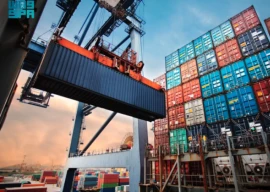By global standards, Byco’s new refinery is not technologically very advanced. In fact, it is not even new, having first been set up in the United Kingdom in 1967. But it represents an important step forward for the country’s refining sector, and Byco’s competitors are likely to have noticed.
Byco Petroleum currently operates the smallest refinery in the country, which has a capacity of processing about 36,200 barrels per day. Its parent group, however, plans to expand the refining operations by adding about capacity for about 120,000 barrels per day.
To do this, the group imported a refinery that was owned by Chevron in Milford Haven, UK. The entire refinery was taken apart and moved to Byco’s 600-acre site in Hub, Balochistan where it has since been re-assembled and re-calibrated to operate in the Pakistani environment. It took almost two years – from 2007 to 2009 – just to move the refinery and another three years to reassemble it.
Byco’s main sponsors – the Abbasi family and the Dubai-based private equity firm Abraaj Capital – have thus far invested $750 million into the refinery project. “We will begin commissioning in the third quarter of 2012 and will begin commercial production from October,” said Muhammad Akram Paracha, the head of refining operations at Byco.
Yet it is not the size of the refinery that is impressive. After all, the Khalifa Refinery being built not much further down the Balochistan coast will be even bigger, with a capacity of about 250,000 barrels per day. What distinguishes this refinery is its ability to process crude oil beyond a level that is currently possible in Pakistan.
Tucked away in the massive refinery complex at Hub is a small segment called the isomerisation unit, the first of its kind in Pakistan and the pride and joy of the company’s engineers. This unit will allow the refinery to convert 12,500 barrels per day of naphtha into motor gasoline, commonly known as petrol. That may not sound significant, but in the world of refining, it is big news.
A majority of the product produced by most refineries in Pakistan yield negative margins, meaning that they sell for below the price of the crude oil that went into making them. Furnace oil, liquefied petroleum gas and naphtha yield either negative margins or at best flat margins. Refineries make their money off diesel fuel and petrol, and even there, the margins are quite narrow, often in the single digits.
Taken together, petrol and diesel constitute about 50% of the refinery’s production. If, however, a refinery is able to add the roughly 8% of its production that is naphtha and yields negative returns into petrol – which yields positive returns – the refinery will significantly boost its profitability.
Byco’s refinery may be old, but it is the only one in Pakistan that will have the capacity to do so, boosting the company’s returns significantly.
Other refineries are also trying to boost their processing capabilities. Pak-Arab Refinery Company, currently the owner of Pakistan’s largest refinery company, wants to begin producing asphalt out of furnace oil, which yields higher margins.
So why are investors not happy?
Despite plans of becoming the largest refinery in the country, most investors appear unimpressed with Byco. The reason: the new refinery will not be owned by the publicly-listed Byco Petroleum, but rather its unlisted parent company, Byco Oil Pakistan.
“Investors are not interested because it [the new refinery] is not going to be part of the listed company,” said Fawad Khan, a research analyst at KASB Securities. “There could be synergies going forward, but the retail investor will get not benefit for now.”
Published in The Express Tribune, April 7th, 2012.
COMMENTS (6)
Comments are moderated and generally will be posted if they are on-topic and not abusive.
For more information, please see our Comments FAQ









1730379446-0/WhatsApp-Image-2024-10-31-at-17-56-13-(1)1730379446-0-270x192.webp)







Well the funny thing is that most investors dont even recognize that the new project is not a part of the listed entity. While the author claims that investors are not impressed, the share price tells a different story - despite posting huge losses, Byco Petroleum (listed company, BYCO) has more than doubled in prices over the last two months.
In fact, Turs/Friday's news of ECC extending 7 yr tax holiday for Byco Oil also resulted in two consecutive upper circuits in Byco Petroleum!!! Just hope our so called investors get the brains not to listen to our "smart" brokers advising them!
well good for the private stakeholder but public investor had nothing but no returns and losses on the investment made in company s shares.
@TsunamiLota Toxic previously produced by refineries was due to the use of Lead in the refining process. Now this practice is not allowed by law. So the toxication due to refining is not a issue anymore however carbon emission can and I am sure will be reduced by using different kind of techniques for which you don't need to build a new refinery it can work as attachment on exhaustion stage that is where gases are emitted. And we SHOULD rejoice because this would help us economically as a country and to Balochistan itself. Plus the SPM project that byco on its own without the help the government is carrying out will help relief our ports and give them time to earn. Not to forget BYCO has done a lot for the villages around its refinery without being even mentioned on a single newspaper.
P.S. love your name
@TsunamiLota: If they spent 3 years assembling it, they could have updated a bit, such as adding incinerators and flue gas chimneys.. cant say anything unless ask them! check and balance is necessary though.. also good to see refineries opening in Balochistan! It will create employment opportunities there!
@Lota come on man dont start inflicting toxic gases on the unsuspecting Baloch Population. The Attock Refinery is in the middle of RWP and its the oldest in the indian subcontinent nobody said inflicting toxic gases on the unsuspecting punjabis. unsuspecting Pakistanis could have been a better approch.
With 1967 machinery, how much pollution will this refinery cause? Refining technology of the 1960s and 1970s was notorious for releasing foul, toxic gases. It is alarming to think that we are rejoicing in this decision to import outdated technology and inflict these toxic gases on the unsuspecting Baloch population.